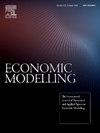Economic distress, democratic quality, and satisfaction with democracy in Europe during COVID-19: A multilevel approach
IF 4.2
2区 经济学
Q1 ECONOMICS
引用次数: 0
Abstract
This study examines how economic distress and democratic quality influenced individuals’ satisfaction with democracy across 27 European countries during the COVID-19 pandemic. Using multilevel mixed-effects models, we find that economic distress significantly reduced satisfaction with democracy, particularly during the pandemic period. This relationship is shaped not only by individual-level conditions but also by the severity of the pandemic at the national level, which amplifies dissatisfaction and intensifies the negative impact of economic distress. While redistributive policies, such as pandemic-related financial assistance, enhance satisfaction, they do not fully offset the adverse effects of distress. In contrast, targeted unemployment spending helps alleviate the negative impact of economic hardship, while income inequality exacerbates it. Finally, higher democratic quality and greater trust in government buffer the negative consequences of pandemic severity. These findings underscore the critical role of well-designed redistributive policies and resilient democratic institutions in maintaining public support for democracy during systemic crises.
2019冠状病毒病期间欧洲的经济困境、民主质量和对民主的满意度:一个多层次的方法
本研究考察了在COVID-19大流行期间,经济困境和民主质量如何影响27个欧洲国家的个人对民主的满意度。使用多层混合效应模型,我们发现经济困境显著降低了对民主的满意度,特别是在大流行期间。这种关系不仅受到个人情况的影响,而且受到国家一级大流行病的严重程度的影响,这种情况扩大了不满情绪,加剧了经济困境的负面影响。虽然再分配政策,如与大流行病有关的财政援助,提高了满意度,但它们并不能完全抵消痛苦的不利影响。相比之下,有针对性的失业支出有助于缓解经济困难的负面影响,而收入不平等则加剧了这种影响。最后,更高的民主质量和对政府更大的信任缓冲了流行病严重程度的负面影响。这些发现强调了精心设计的再分配政策和富有弹性的民主制度在系统性危机期间维持公众对民主的支持方面的关键作用。
本文章由计算机程序翻译,如有差异,请以英文原文为准。
求助全文
约1分钟内获得全文
求助全文
来源期刊

Economic Modelling
ECONOMICS-
CiteScore
8.00
自引率
10.60%
发文量
295
期刊介绍:
Economic Modelling fills a major gap in the economics literature, providing a single source of both theoretical and applied papers on economic modelling. The journal prime objective is to provide an international review of the state-of-the-art in economic modelling. Economic Modelling publishes the complete versions of many large-scale models of industrially advanced economies which have been developed for policy analysis. Examples are the Bank of England Model and the US Federal Reserve Board Model which had hitherto been unpublished. As individual models are revised and updated, the journal publishes subsequent papers dealing with these revisions, so keeping its readers as up to date as possible.
 求助内容:
求助内容: 应助结果提醒方式:
应助结果提醒方式:


